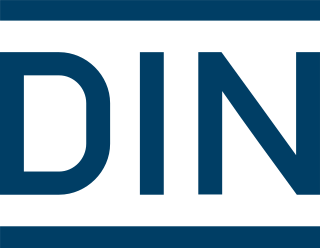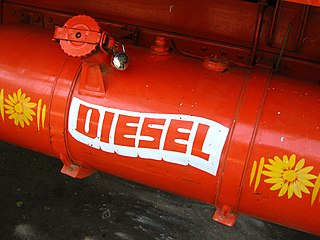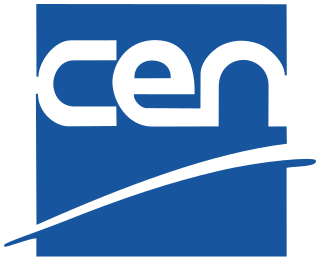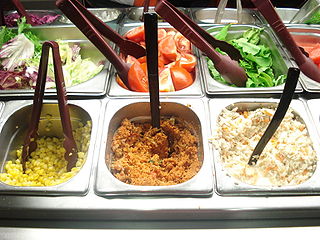
Deutsches Institut für Normung e.V. is the German national organization for standardization and is the German ISO member body. DIN is a German Registered Association (e.V.) headquartered in Berlin. There are currently around thirty thousand DIN Standards, covering nearly every field of technology.

Diesel fuel in general is any liquid fuel specifically designed for use in diesel engines, whose fuel ignition takes place, without any spark, as a result of compression of the inlet air mixture and then injection of fuel. Therefore, diesel fuel needs good compression ignition characteristics.

The European Committee for Standardization is a public standards organization whose mission is to foster the economy of the European Single Market and the wider European continent in global trading, the welfare of European citizens and the environment by providing an efficient infrastructure to interested parties for the development, maintenance and distribution of coherent sets of standards and specifications.

The water industry provides drinking water and wastewater services to residential, commercial, and industrial sectors of the economy. Typically public utilities operate water supply networks. The water industry does not include manufacturers and suppliers of bottled water, which is part of the beverage production and belongs to the food sector.
European Standards (EN) are technical standards that have been ratified by one of the three European standards organizations: European Committee for Standardization (CEN), European Committee for Electrotechnical Standardization (CENELEC), or European Telecommunications Standards Institute (ETSI). All ENs are designed and created by all interested parties through a transparent, open, and consensual process.
Deutsche Kommission Elektrotechnik Elektronik Informationstechnik im DIN und VDE, abbreviated DKE, is the German organisation responsible for the development and adoption of standards and safety specifications in the areas of electrical engineering, electronics and information technologies.

Gastronorm (GN), sometimes spelled Gastro-Norm, is a European standard for kitchenware tray and container sizes that is commonly seen worldwide in the catering and professional food industry, as well as in certain parts of the high-end consumer market. Gastronorm is generally used worldwide except in the United States, which has its own domestic system. The gastronorm standard was first introduced in Switzerland in 1964 and became an official European standard in 1993 with the EN 631 standard.

The British Standards Institution (BSI) is the national standards body of the United Kingdom. BSI produces technical standards on a wide range of products and services and also supplies certification and standards-related services to businesses.

Deutsches Institut für Bautechnik (DIBt) is a technical authority in the construction sector. The Institute carries out its activities on the basis of an agreement concluded between the Federation and the German federal states (Länder). Its most important task is the approval of non-regulated construction products and construction techniques. The Institute is based in Berlin.
EN 15038 is a withdrawn quality standard developed especially for translation services providers. The EN 15038 standard ensured the consistent quality of the service. In 2015, CEN withdrew EN 15038 and adopted ISO 17100 as a European standard.
The German national standard DIN 5008 by Deutsches Institut für Normung (DIN) specifies writing and layout rules for word processing. As such it is one of the fundamental standards for office communication and administrative work in Germany. Today, the standard is maintained by the Normenausschuss Informationstechnik und Anwendungen – Fachbereich Bürotechnik, Bankwesen und elektronisches Geschäftswesen.
CEN/CENELEC Guide 6: Guidelines for standards developers to address the needs of older persons and persons with disabilities is a document for participants in standardisation activities at CEN and CENELEC that contains guidance for the creation and the revision of standards to ensure greater accessibility of products and services. The document is a "Guide", in other words, not a European Standard (EN). The guide is identical to ISO/IEC Guide 71 and was adopted by both the CEN Technical Board and the CENELEC Technical Board, and published in January 2002. The adoption of CEN/CENELEC Guide 6 resulted from a European mandate to the European standardisation organisations, and the European Commission is funding projects to promote the use of the Guide.
NORMAPME or European Office of Crafts, Trades and Small and Medium-sized Enterprises for Standardisation was created in 1996 by UEAPME with the support of the European Commission. The German name is: Europäisches Büro des Handwerks und der Klein- und Mittelbetriebe für Normung.

A roller container is a container type that can be carried by trucks to be pushed to ground level by help of a hook and level arm with the container possibly sliding on steel roller wheels.

Cyprus Organisation for Standardisation or CYS, is the National Standardisation Body of Cyprus, whose principal activity is the production of standards and the supply of standards-related services.
The International Union of Air Pollution Prevention and Environmental Protection Associations (IUAPPA) is an international federation of civil society organisations concerned with air pollution. IUAPPA, founded 1964 at the urging of the US Air Pollution Control Association, has 40 national organisations such as; the United States, Germany and Japan and has networks and representatives in most others countries. The Foundation is seen as one milestone in the "Ecological Revolution" in and around 1970.
Carl-Alexander Graubner is a German civil engineer and since 1996 professor at the TU Darmstadt. Since 2007 he has been a member of the University Assembly TU Darmstadt and since 2012 chairman of the mirror committee "masonry" in the DIN.

DGQ is a membership organization, which was founded in 1952 by Technical Statistics Committee under Committee for Economical Production. Since 1972, DGQ is legally independent under its present name.

DIN 7876 is a German standard specifying how swimming fins should be dimensioned, tested and marked for conformity. In 1980, the Deutsches Institut für Normung (DIN) published consecutively numbered German standards DIN 7876, DIN 7877 and DIN 7878 dedicated respectively to the swimming fin, the diving mask and the breathing tube, which constitute basic underwater diving equipment. DIN 7876 of October 1980 is entitled Tauch-Zubehör – Schwimmflossen – Maße, Anforderungen und Prüfung in German and subtitled “Diving accessories for skin divers; Flippers, dimensions, requirements and testing” in English. This standard establishes certain quantitative and qualitative specifications for swimming fins, with particular reference to foot pockets and heel straps. Swimming fin manufacturers fulfilling such requirements may mark their products as compliant with this standard. The status of DIN 7876 is currently zurückgezogen, meaning: “withdrawn”.










